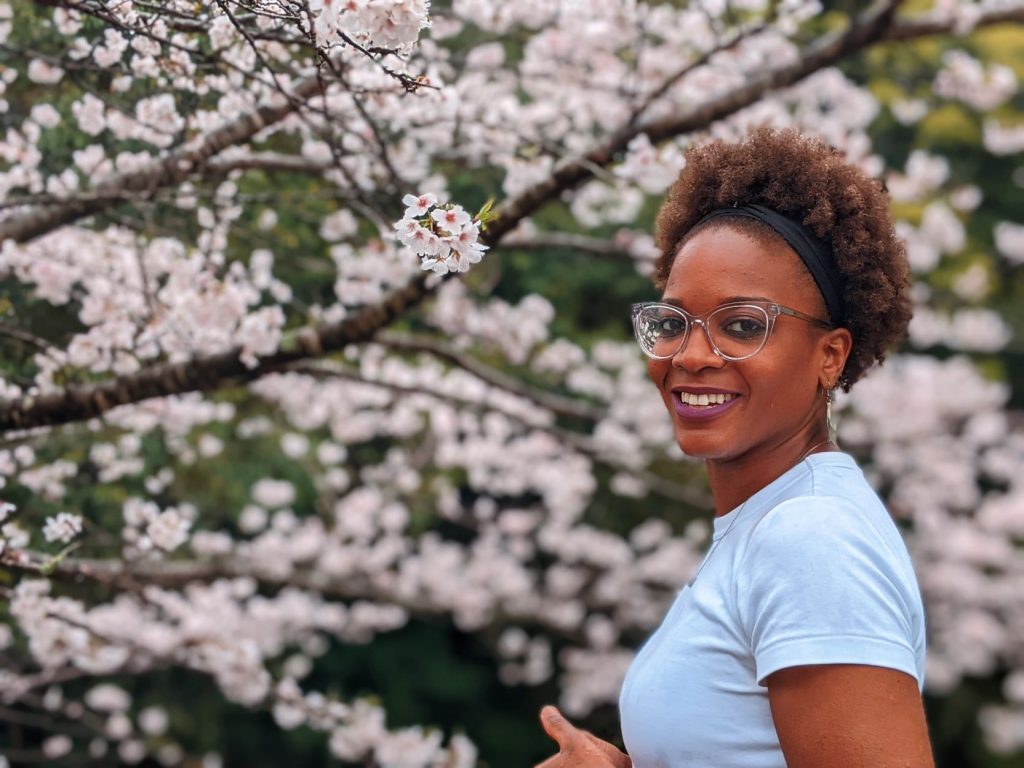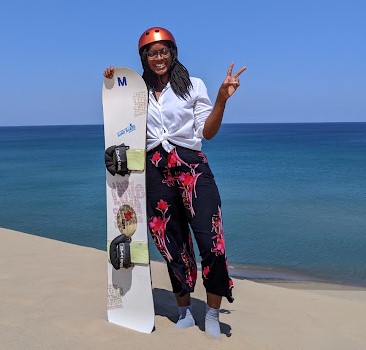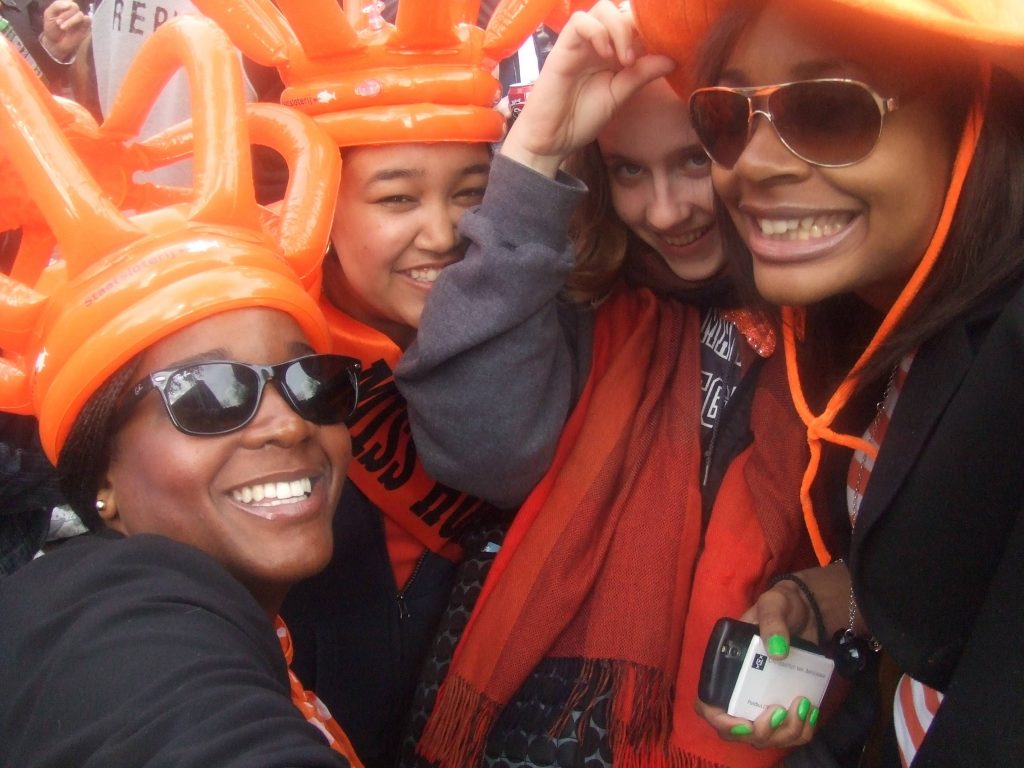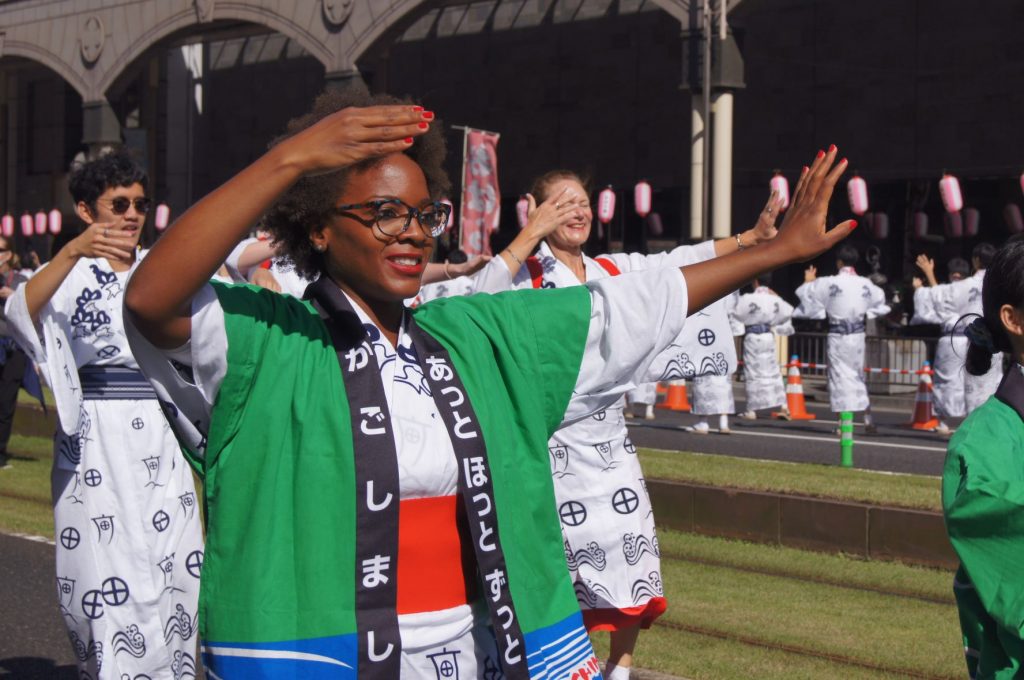For Melissa Phineus, international education is personal
February 28th, 2022 | SIT Study Abroad

Photos courtesy of Melissa Phineus
As the bilingual child of immigrants growing up in a multicultural neighborhood of Boston, Melissa Phineus developed a broad worldview early on.
She knew from high school that she wanted to study abroad in college. So it came as a surprise when, after a college semester in the Netherlands with SIT, Melissa's friends on campus asked her why she hadn't shared more with them about studying abroad.
That's when she began to recognize how study abroad—a microcosm of higher education at large—reflects its gatekeepers. And that's in part why international education is personal for Melissa, and why she wants to help change not only the way students access study abroad, but also the study abroad sector writ large.
Melissa joined SIT as a university relations manager in September 2021. In addition to her role as liaison with colleges and universities in New York and New England, her position has a special focus on diversity, equity, and inclusion (DEI), which is a new scope within SIT's University Relations department.
An alumna of the SIT Netherlands: International Perspectives on Sexuality and Gender program, Melissa received her BA in sociology/anthropology from Denison University and an MEd in educational leadership and policy studies from Boston University.

Prior to joining SIT, she spent two years teaching English to junior and senior high school students in Kagoshima, Japan, through the JET Program. While there, she learned Kyūdō (Japanese archery), became a tourism ambassador for Kagoshima, and traveled throughout Japan.
Originally from Boston, Melissa identifies as bicultural, First-Gen, a Posse alum, a Janey Scholar alum, and a member of a historically Black sorority.
What drew you to the field of international education?
Working in international education is personal for me. When I entered undergraduate school, I knew I wanted to study abroad. The idea was first planted by a high school teacher of mine who talked about his college experiences. He mentioned studying abroad and the amazing time he had in Europe. He was my favorite teacher, so I didn’t need to hear much else. I was sold on the idea and knew that I would also study abroad while in college. So, when I entered, the study abroad office was one of the first places on campus I sought out. But the idea to work in the field didn’t come to mind until I returned to campus.

When I returned to campus the fall of my senior year, I talked about the amazing time I had abroad with my friends, many of whom were Posse scholars like myself. And it was in those conversations that I was inspired to work in the field. My friends, first-generation college students of color, asked me why I didn’t tell them about study abroad—why I didn’t share the information with them—because they didn’t know and would have liked to do it, as well. Those words stuck with me. And that’s when I knew I wanted to work in international education (IE).
As professionals in the international education field, we are gatekeepers ... to opportunities that many students, especially those who are marginalized, think are out of reach.
As professionals in the international education field, we are gatekeepers: gatekeepers to opportunities that many students, especially those who are marginalized, think are out of reach. And it’s important that we remember that. I want to be able to spread the word and share the knowledge I have with those who are in the dark. It’s important to me that I do that because I don’t want to feel like I’m withholding information that someone else might find useful.
Can you tell us about your own experiences studying and working abroad, and what initially sparked that interest for you?
When I studied abroad in the Netherlands, it was my first time overseas without my family. Then, many years later, after completing graduate school, I applied to the JET Program to work and teach abroad in Japan. I treasure both experiences for the mental freedom they’ve given me.
I don’t think I would have had the courage to take on both experiences without my upbringing. Though I was born in the States, my mother and father emigrated to the U.S. from Haiti many, many years ago. Throughout my youth, I would travel to Haiti and spend summers there. Having a second culture, speaking a second language, and growing up in a culturally diverse community in Boston, all these aspects sparked my interest in traveling and working abroad.
Specifically, why did you choose the SIT Netherlands program and how would you describe that experience? Did it influence your own academic or career path in any way?
I chose the SIT Netherlands program because, in my mind then, the topic was unconventional. A program focused on sexuality and gender conflicts, I was sold! It being based in Europe was a bonus.
I’m not sure the program shaped my academic path in the long run. As a sociology/anthropology major in undergraduate, my major gave me the freedom to explore my interests. However, the program absolutely influenced my career. It was my time on the program that exposed me to the field of international education. When I entered college, I was pre-law, not for any reason except for the fact that many children of immigrants are told to either be doctors or lawyers! I didn’t know the IE field existed until I studied abroad.
You now work for SIT as a university relations manager tasked with DEI outreach. This is a new position, so you’ll have the opportunity to shape it. How would you like to see this role take shape?
That’s a big question. The truth is, I’m still figuring that out. I have so many ideas and have uncovered so much in the first six months in the position.
DEI work is personal, and I’d like to make sure that the role remains that way. So, when it comes to partnerships, I want to deepen our relationships with university partners so that they see us as leaders in DEI and know that we truly care. I’ve had great conversations with partners so far about their DEI efforts and I’d like to engage in more of those conversations and find ways for us to work together in those efforts.

One thing I’m still thinking through is how to better support minority-serving institutions and their students. There are many barriers that prevent students from these schools from studying abroad, so I’d love to find a way for us to connect with more of them and work toward solutions together.
We know about racialized systemic inequities within higher education. How do those play out in the field of study abroad? How can we make study abroad more diverse?
I mentioned earlier that as professionals in the field of international education we are gatekeepers. Well, for too long, the keepers of those gates did not resemble everyone in higher education. Study abroad is a branch in the higher education ecosystem, so if colleges and universities were built with only specific people in mind, then the branches that grow from them inherited those ideas. In other words, study abroad has been as racially unequal as any other system within higher education.
Evaluating the very core of study abroad is how to remedy the lack of diversity.
As for how to make the field more diverse, there isn’t a simple answer. Higher education was designed to be exclusive, and something that is designed that way is flawed in its core. The best way, in my opinion, to make the field more diverse is to “break the wheel.” Anyone who is a Game of Thrones fan will get that reference. But anyway, it’s the truth.
Evaluating the very core of study abroad is how to remedy the lack of diversity. Everything about it. Everything from where we send students and why, who we hire and why, what institutions we partner with and why, who the leaders are in the field and why, etc., etc. Because again, gatekeepers determine who has access and doesn’t. If the field isn’t diverse, it’s because the gatekeepers before intended for it to be that way, and so it is.
I do believe there are people who truly care about DEI work in the field of study abroad. But those people can’t do it alone and certainly not without the support of their superiors. Everyone needs to participate in making the field more diverse, on both a professional level and personal level.
The pandemic has intensified students’ need for support across the board. What should that support look like for students on study abroad programs? What are the specific needs for students of color or those who identify as LGBTQI+?
From what we’re hearing from partners and students, mental health is one aspect in which more support is needed. For obvious reasons, the pandemic has caused a great deal of stress, and that stress has chipped away at our health physically, emotionally, and mentally. Students were not exempt from that. The support students need right now should include more mental health support, understanding and collaboration when it comes to academics, and grace. Faculty and staff are experiencing these same challenges, and these are examples of the things we’ve needed to cope.
The needs of students of color and those who are LGBTQI+ are the same as before, but this time we need to actually do something about it and provide the support. We are seeing a significant interest in study abroad from students. Students are ready to go and there’s a sense of urgency. The pandemic delayed their plans and so they see their window closing on opportunities like study abroad. BIPOC and LGBTQI+ students are included in that.
The great thing about this generation of students is that if you ask, they’ll tell you.
So, if we’re seeing that ALL students are in this state of urgency, we need to make sure that our support systems are in place. For instance, we know that minoritized students can feel isolated and “othered” on abroad programs when they are the only of their group on a program. This is an ongoing challenge, and it continues to be the case because there isn’t a single answer, single solution. The solution is likely a combination of things like admissions, funding, preparation, and representation.
The great thing about this generation of students is that if you ask, they’ll tell you. They’re so vocal about what they want, especially when it comes to changes, they want to see. We just have to ask and be ready to support them in those ways. This is something I look forward to doing in my role: connecting with diverse students and hearing what they have to say.
